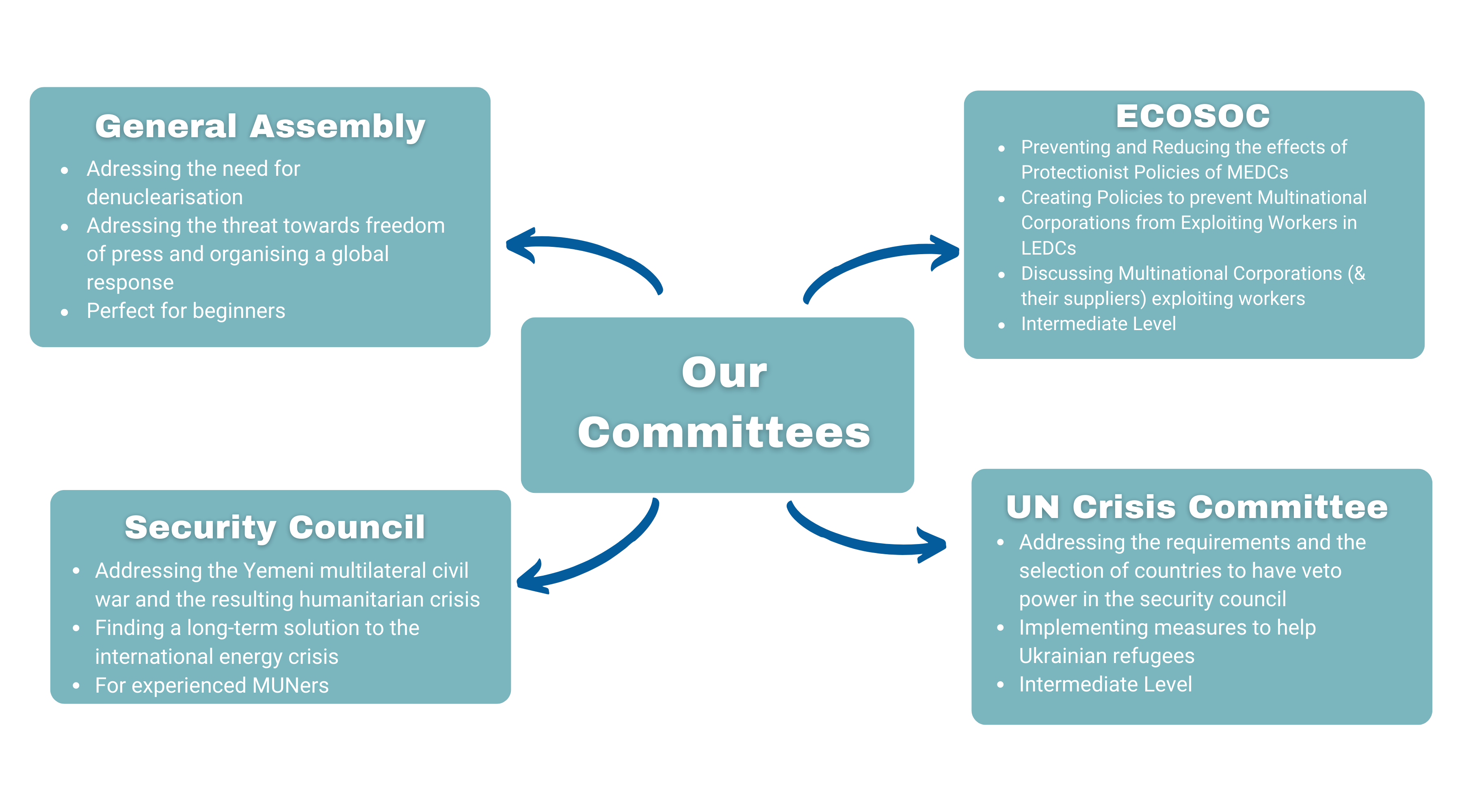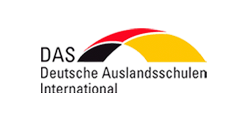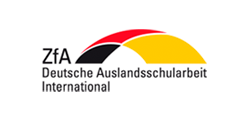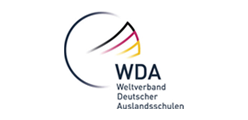
GENERAL ASSEMBLY
The delegates partaking in the sessions of the General Assembly are expected to debate these topics. Each delegate will have researched their country’s stance on the topics and represent it at the conference.
This committee is for the slightly less experienced members of MUN, and for those who are creative and interested in debating on very global topics.
Introduction to General Assembly
Role Now
The General Assembly is the largest UN policy organ, as it includes all 193 member states. It is responsible for
- appointing the Secretary-General on the recommendation of the Security Council
Electing the non-permanent members of the Security Council
- Approving the UN Budget
- The creation of non-binding policies
The delegates will be doing the latter. In the General Assembly you will discuss the topics
- Addressing the need for global denuclearisation
- Discussing the issue of freedom of press and forming a policy which will protect it.
What is expected of the delegates at the DSBMUN
The delegates partaking in the sessions of the General assembly are expected to debate on these topics. Each delegate will have researched their countries stance on the topics and represent it at the conference.
During the sessions, countries will form into blocs with other delegates that have similar interests or ideas they are wishing to discuss. The groups will form draft resolutions that will be altered through strikes and amendments. At the end there will be a vote to see if a resolution passes on each topic. All necessary procedures will be reiterated before the start of the conference, therefore delegates with little prior experience don’t have to worry about knowing all the terms by heart. It is however recommended to take a look at the procedures in the link below.
The delegates must dress appropriately and be respectful towards one another. The research papers on our website will provide you with an overview of each topic.
We welcome you at our first General Assembly session, at DSBMUN!
RESEARCH REPORTS
GA-DENUCLEARIZATION-DSBMUN.pdf

ECOSOC
The topics debated during the sessions in EOCSOC will be more specific, as they focus on the economic and social aspects and consequences of globalization. All delegates are expected to have researched their country’s position in order to represent it accordingly.
This committee is great for all intermediate delegates who have been doing MUN for a few months and have attended at least one conference.
The Economic and Social Council, usually called ECOSOC, was created by the United Nations in 1945 as one of the six principal organs of the United Nations. It plays a major key role in promoting gender equality, enhancing peace and development, responding to global emergencies and in fighting HIV/AIDS.
The topics you will discuss in this committee at conference DSBMUN are:
1. Preventing and Reducing the effects of Protectionist Policies of MEDCs
The free market trade policies play a big role in widening the gap between rich and poor economies, allowing the big, powerful ones to profit from the weaker ones. The US-based Global Financial Integrity (GFI) and the Centre for Applied Research at the Norwegian School of Economics published data which proves that the flow of money from rich countries to poor countries is modest in comparison to the flow in the other direction.
2. Creating Policies to prevent Multinational Corporations from Exploiting Workers in LEDCs
Multinational corporations (MNCs) are an unavoidable part of our globalised world. These companies are defined by having business operations in at least one country other than their home country, in collaboration with suppliers, holding a global presence and a strong influence on governments.
However, MNCs (and more often their suppliers) are usually cast as villains, exploiting their workers in countries without strong labor laws. The question is, do they hold true to stereotypes and perpetuate exploitative behavior?
We, the chairs of ECOSOC, can’t wait to see how these topics will be debated in our committee and hope every delegate will enjoy and learn something from them
Research Reports

SECURITY COUNCIL
The delegates representing countries in the Security Council are expected to be have taken part in several MUN conferences and to be familiar with the rules of procedure and the protocol.
As we will be debating complex topics involving international diplomacy and global economy, we ask the delegates to be aware of their big responsibilities and power to influence politics worldwide.
Introduction to Committee – Security Council
When the United Nations Organization was founded in 1948, one of their six principal organs, and the most important one, was the United Nations Security Council (UNSC).
It has primary responsibility for the maintenance of international peace and security. Other responsibilities include recommending the admission of new UN members to the General Assembly, and approving any changes to the UN Charter. The Security Council can establish peacekeeping operations, enact international sanctions, and authorize military action.
Furthermore the UNSC is the only UN body with the authority to issue binding resolutions on all member states.
Like the UN as a whole, the Security Council was created after World War II to address the failings of a previous international organization, the League of Nations, in maintaining world peace.
The Security Council consists of 15 members and each member has one vote. Five of the fifteen members are permanent: the United States of America, the Russian Federation , France, the United Kingdom, and China. These five delegations are the only ones with a right to veto, which allows them to block any substantive resolution, including those on the admission of new member states to the United Nations or nominees for the office of Secretary-General.
The reasoning for their permanence and veto right is that they were the victors of World War II.
The other ten members are elected by the General Assembly for a term of two years, meaning these are non-permanent members.
Furthermore, resolutions of this Council are typically enforced by UN peacekeepers, which consist of military forces voluntarily provided by member states and funded independently of the main UN budget.
Although the UNSC has a long record of successful international activity, such as the Human Rights Declaration of 1948, the decolonization and the Convention on the Law of the Sea, not everyone places great value on it. There have been countless and bloody wars, some of them even approved by the Security Council, and endless conflicts where the UNSC has done very little, such as the Kashmir dispute or the Rwandan civil war in the 90s.
In conclusion, even if the Security Council remains highly controversial, its contribution regarding international diplomacy is undeniable, and so is the immense power that it holds. Therefore, we invite all of you delegates of DSBMUN 2023, to take your responsibility as representatives in the most powerful body of the United Nations very seriously and, above all, to use it to create permanent solutions to the issues that will be debated.
Research Reports

UN CRISIS COMMITTEE
The delegates participating in the UN Crisis Committee are expected to have previously researched their country’s stance on both topics: veto restrictions as well as Ukranian refugees’ protection.
The committee is intended for intermediate debaters who are interested in discussing recent concerns surrounding the current war in Ukraine.
The United Nations Crisis Committee will be discussing both of these aspects during the conference: Addressing the requirements and the selection of countries to have veto power, as well as implementing measures to help Ukrainian refugees. The debate will be chaired by Anastasia Salvat, Stella Tarradelles and Julia Martín.
The committee is intended for interested students at an intermediate level, who can criticise the system whilst not forgetting about their country’s opinion and can therefore propose creative solutions.
Each delegate is expected to have researched both topics as well as know their country‘s stance. Debaters will form groups with whom they share opinions and draft a resolution together, which will later on be discussed upon. Delegates must wear appropriate attire as well as be respectful towards one another.
Warm welcome to the UN Crisis Committee’s first conference!
Research Reports

The DSBMUN team






